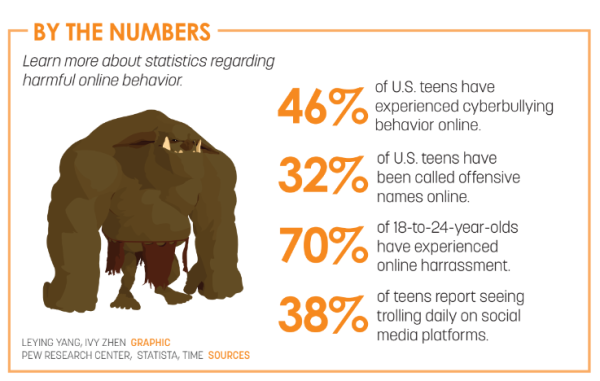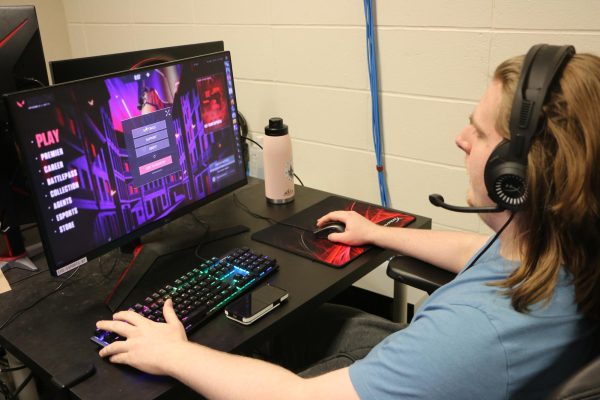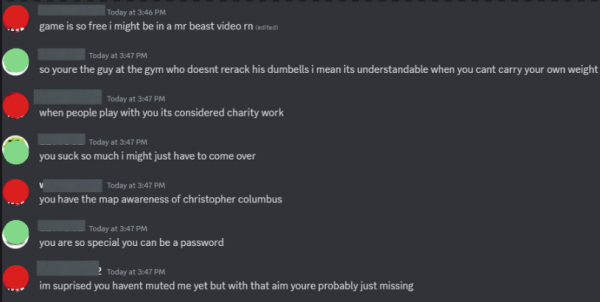As the amount of websites and restrictions online continue to grow, people have found it harder to tolerate the freedom of speech online while considering toxic comments. Logan MacRae, Junior and Varsity Valorant Esports member, said he has encountered a lot of toxic people online, which he believes comes from being anonymous.
“I’ve played video games for a hot minute and I can say with a certainty that I’ve seen pretty much everything under the sun,” he said. “Everything from racism and sexism, online that’s pretty common, the most common forms of toxicity. I just think online people are more prone to be really mean, mainly because no one knows who they are and I think it’s pretty sad. For sure people also may think it’s just funny, but in the end they do it because they know there are no consequences.”
MacRae remembers one specific scene that has stuck with him, due to the absurdity of the comment from someone he met in just one minute.
“So I was playing the FPS game Valorant and I said I was going to play the agent Phoenix, who is black and then someone just called me the N-word for picking him. I started laughing because I was really surprised, it was an awkward laugh because I literally just met this person. I think we were all surprised by it, but then I just muted him because that was an option.”
According to Computer Science Teacher Sarah Robinson, being able to hide behind a screen contributes to the reason why there is so much negativity online.
“Anonymity can exemplify toxic behavior. When people aren’t being held accountable for their actions and expressions they are likely to share more negativity,” Robinson said. “On the flip side of this, people can also be more likely to respond in a more negative way towards someone that is anonymous because they are not associating a human face or name with the opinion. I think anonymity is important in some situations, but platforms should consider what they are allowing a user to do anonymously.”

MacRae said he also realizes people online will respond to toxic comments more often, but blocking them is the best solution.
“People just don’t have self control, when there’s a type of toxic stuff online and you have the ability to not see it, (the websites) are giving you all the tools to not see it,” MacRae said. “You can block people, you can choose what you want to see and hear, but if you don’t choose to do that, then it’s your fault for a lack of self control. People like getting mad even though it makes them unhappy. People still chase after it because it makes things interesting, they like drama. While most can definitely just ignore toxicity online, muting often doesn’t happen because getting a reaction is better than no reaction.”
Senior and artist Vaishu Majji also said that ignoring malicious comments is a good option, but it is ultimately up to a person to take active action in blocking out this negativity.

“Hiding likes and comments, I feel like, is a person’s personal choice. Because it is your account after all, you have the right to decide what to do with it. If you want to create a positive community, making filters for certain comments is a way to do that, after all it does affect the poster’s own mental health and everything,” Majji said. “It could be like a certain influencer causing controversy and the comments are calling them out, but are getting deleted, but that is a completely different situation. For personal instagram accounts if people are being mean for no reason, it’s completely reasonable to disable comments for your own wellbeing.”
MacRae said whenever there is a toxic person in his lobby, he just mutes them since he doesn’t believe in prolonging interactions with unpleasant people.
“On YouTube I see people disabling comments all the time and that makes sense. And in Valorant I just mute people when they start being toxic, even if they troll my actions in the game, I’m still not going to talk to them,” he said. “I don’t think we can change the other end of toxic people online, it’s just human nature sometimes, doing the wrong thing. Even with user bans being a thing, it’s really hard to get people banned to stop toxicity forever, there’s always alt accounts and VPNs. I’m not trying to victim blame, but it is up to us receiving the toxicity to just move on, since at the end of the day you will never have to see that anonymous toxic person ever again.”
With platforms becoming filled with more people, that also includes bad tempered people. However, Robinson thinks restrictive actions like comment disabling can prevent or lower this toxicity.
“I think comment disabling is a great feature, especially on content that is available for large and diverse populations,” Robinson said. “While people should be permitted to express their opinions, people should also have the choice to keep others from posting or commenting directly on their own posts. While I can’t think of a specific example that has had a large impact on me, when really being subject to all of the toxic comments whether directly to us or to others is probably negatively affecting us more than we realize.”
Majji expressed a similar observation like Robison on freedom of expression being used more negatively online.
“Online, people have this perception that no one can find you because your name is not on there, but then IP addresses exist and that stuff and you can actually be found pretty easily,” she said. “But this perception of they won’t even know it’s me, it’s not like I’m going in person, in the end it’s really the same thing. You are still saying the same thing and people are still going to end up being hurt.”
While she says online and in person bullying are very similar, Majji says what separates the two is that online users have higher confidence in criticizing.
“I’ve seen some people, like on my friends art accounts, some people comment ‘oh, your art is so bad’ or something like that, but art in itself is subjective, like everyone has their own opinions, but in person you wouldn’t really go up to a person and say ‘oh this art sucks,’” Majji said. “But on the internet people are more inclined, or entitled, to share their own opinions on people’s passions, but you know people wouldn’t say that in person. It’s because you can’t really see the person, so that kind of gives people a false self of bravery, this false sense of security, like ‘oh they can’t really see me, so I can do whatever I want.’”
Although it does increase the amount of toxicity online, Majji still believes anonymity is crucial online.
“I feel like anonymity is a person’s right in some form, especially online. You should decide if you want your name or not to be put on here, but that doesn’t excuse you from being a bad person. I feel like people should have the right to know what information is being shared and why, and I don’t want my information to be shared for no reason and to protect my own rights.”
MacRae agrees, saying that anonymity is like a double edged sword and not appreciated enough.
“I think that a lot less people would be less inclined to use the internet if they didn’t have anonymity. At the end of the day, there will always be bad people online, anonymous or not. But privacy is so important and we often don’t value that enough in today’s digital world,” MacRae said. “Having that little privacy of people not immediately knowing who we are online, is a good thing. It’s comforting too when you can hide online.”

Knowing that restricting speech online doesn’t fix all the problems, Robinson looks to teaching students about online privacy and behavior as a possible solution.
“I think bringing awareness to the fact that this behavior affects people so people can recognize how it affects themselves and others is key,” she said. “I think awareness and discussion is much more effective than trying to combat negative comments or content by responding in comments of the same form.”
Majji agrees, saying how the school lectures for online interactions have values, calling out toxic online interactions just as bad as in person.
“The cyberbullying information we have at school sometimes seems stupid, but it serves a purpose. If you look at it from an outside perspective, toxic comments just come with a sense of immaturity, just like how bullying in person is just embarrassing,” she said. “We as a society look at those stereotypical bullies in movies as cringe, but then you see the spike in cyberbullying online and think it’s different, but from an outsider’s perspective it’s the same thing. Just because you hide behind a screen doesn’t make your actions any different, just more sad.”

































![AI in films like "The Brutalist" is convenient, but shouldn’t take priority [opinion]](https://hilite.org/wp-content/uploads/2025/02/catherine-cover-1200x471.jpg)










































![Review: “The Immortal Soul Salvage Yard:” A criminally underrated poetry collection [MUSE]](https://hilite.org/wp-content/uploads/2025/03/71cju6TvqmL._AC_UF10001000_QL80_.jpg)
![Review: "Dog Man" is Unapologetically Chaotic [MUSE]](https://hilite.org/wp-content/uploads/2025/03/dogman-1200x700.jpg)
![Review: "Ne Zha 2": The WeChat family reunion I didn’t know I needed [MUSE]](https://hilite.org/wp-content/uploads/2025/03/unnamed-4.png)
![Review in Print: Maripaz Villar brings a delightfully unique style to the world of WEBTOON [MUSE]](https://hilite.org/wp-content/uploads/2023/12/maripazcover-1200x960.jpg)
![Review: “The Sword of Kaigen” is a masterpiece [MUSE]](https://hilite.org/wp-content/uploads/2023/11/Screenshot-2023-11-26-201051.png)
![Review: Gateron Oil Kings, great linear switches, okay price [MUSE]](https://hilite.org/wp-content/uploads/2023/11/Screenshot-2023-11-26-200553.png)
![Review: “A Haunting in Venice” is a significant improvement from other Agatha Christie adaptations [MUSE]](https://hilite.org/wp-content/uploads/2023/11/e7ee2938a6d422669771bce6d8088521.jpg)
![Review: A Thanksgiving story from elementary school, still just as interesting [MUSE]](https://hilite.org/wp-content/uploads/2023/11/Screenshot-2023-11-26-195514-987x1200.png)
![Review: "When I Fly Towards You", cute, uplifting youth drama [MUSE]](https://hilite.org/wp-content/uploads/2023/09/When-I-Fly-Towards-You-Chinese-drama.png)
![Postcards from Muse: Hawaii Travel Diary [MUSE]](https://hilite.org/wp-content/uploads/2023/09/My-project-1-1200x1200.jpg)
![Review: "Ladybug & Cat Noir: The Movie," departure from original show [MUSE]](https://hilite.org/wp-content/uploads/2023/09/Ladybug__Cat_Noir_-_The_Movie_poster.jpg)
![Review in Print: "Hidden Love" is the cute, uplifting drama everyone needs [MUSE]](https://hilite.org/wp-content/uploads/2023/09/hiddenlovecover-e1693597208225-1030x1200.png)
![Review in Print: "Heartstopper" is the heartwarming queer romance we all need [MUSE]](https://hilite.org/wp-content/uploads/2023/08/museheartstoppercover-1200x654.png)



